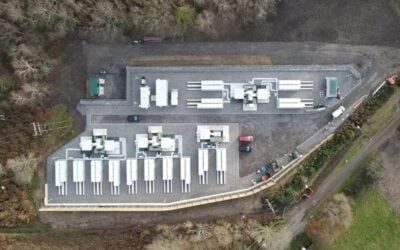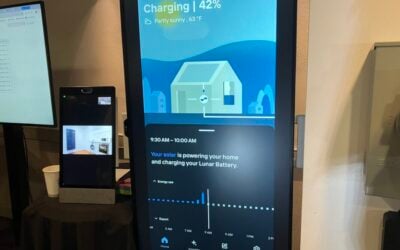Better visibility into systems afforded by energy management systems can aid self-consumption, but at present even smart meters would not translate this into a significant economic benefit to the household. Image: SMA.
It would be unfair to put the burden of paying for the rollout of smart meters onto German households with PV-plus-storage when the devices would primarily benefit grid operators, trade association BSW Solar has said.
Jorg Mayer, the group’s managing director, told Energy-Storage.News that Germany’s grid operators were starting to accept that small-scale energy storage systems enabled with peak shaving functions can limit energy demand and therefore could allow for grid capacity increases.
Especially in the country’s south, which has a high penetration of PV on the grid, Mayer said, grid operators, “are welcoming those storage systems, because it gives them the possibility to install additional PV without enhancing the grid”.
However, Mayer said, the operators, “say that the storage and the theme of self-consumption ‘destroys’ old, established load profiles which they work with for planning grid capacities”.
Try Premium for just $1
- Full premium access for the first month at only $1
- Converts to an annual rate after 30 days unless cancelled
- Cancel anytime during the trial period
Premium Benefits
- Expert industry analysis and interviews
- Digital access to PV Tech Power journal
- Exclusive event discounts
Or get the full Premium subscription right away
Or continue reading this article for free
Battle to accomodate solar ‘prosumers’
Among the various aspects of Germany’s famous ‘Energiewende’ (‘energy transition’) under discussion, ahead of an expected review of the policies in 2017, are possible ways of increasing visibility into networks. Germany has so far resisted proposals, including those made at European level, for the total rollout of smart meters to households pledged by other countries including Britain.
The European Commission (EC) has an overarching target of getting smart meters to an 80% penetration of the continent’s electricity markets by 2022. However, Germany has only agreed to target 23% of electricity users by 2020, starting with heavy industrial consumers of electricity and trickling down to consumers of 6,000kWh electricity demand per year, constituting an estimated 2 million homes.
However, the topic remains an open question and some of the country’s distribution grid operators now want to see smart meters put into the homes of PV-plus-storage system owners. As mentioned by Mayer, their argument is that planning procedures and methodologies are being made more difficult by the increasing numbers of PV ‘prosumers’, or people who generate and use their own electricity onsite.
“They are asking for smart meters because they want to know in real time what the load and production profile of those prosumer households is.”
“This is a small battle because on one side, the solar industry in Germany is in favour of digitalisation, but not at the burden of the prosumers because right now the introduction, the roll-out of smart meters, which is demanded by the grid operators, costs money and prosumers are asked to pay for this investment, and this makes the profitability of a PV plant or a PV plant with storage worse.”
Mayer said that with the policy design as it is, the meters would primarily benefit the grid. Various sources cite the cost of the devices as being at least a couple of hundred Euros, which could be prohibitive to the uptake of solar.
Smart meters more a future prospect in Energiewende
Ultimately, Mayer and others in the industry concede that bi-directional metering could be of use to the consumer as well, but not without changes to the market, for example in the wake of the possible introduction of flexible electricity pricing that could value time-of-day production and make, and use, the differentiation between peak and off-peak prices great enough that it would be worth consumers changing their consumption habits. For large producers of power in Germany, including renewables, bi-directional metering allows them to arbitrage to trade power at the most favourable prices and costs. However, as it stands, this would not be the case at a smaller scale.
Furthermore, some grid operators have said that the technology they use to monitor networks would not be compatible with smart metering technology for at least two years, even if the rollout were to happen today.





